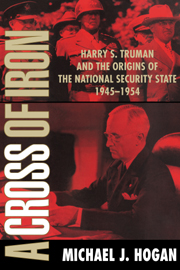Book contents
- Frontmatter
- Contents
- Preface and Acknowledgments
- 1 The National Security Discourse: Ideology, Political Culture, and State Making
- 2 Magna Charta: The National Security Act and the Specter of the Garrison State
- 3 The High Price of Peace: Guns-and-Butter Politics in the Early Cold War
- 4 The Time Tax: American Political Culture and the UMT Debate
- 5 “Chaos and Conflict and Carnage Confounded”: Budget Battles and Defense Reorganization
- 6 Preparing for Permanent War: Economy, Science, and Secrecy in the National Security State
- 7 Turning Point: NSC-68, the Korean War, and the National Security Response
- 8 Semiwar: The Korean War and Rearmament
- 9 The Iron Cross: Solvency, Security, and the Eisenhower Transition
- 10 Other Voices: The Public Sphere and the National Security Mentality
- 11 Conclusion
- Selected Bibliography
- Index
1 - The National Security Discourse: Ideology, Political Culture, and State Making
Published online by Cambridge University Press: 03 May 2010
- Frontmatter
- Contents
- Preface and Acknowledgments
- 1 The National Security Discourse: Ideology, Political Culture, and State Making
- 2 Magna Charta: The National Security Act and the Specter of the Garrison State
- 3 The High Price of Peace: Guns-and-Butter Politics in the Early Cold War
- 4 The Time Tax: American Political Culture and the UMT Debate
- 5 “Chaos and Conflict and Carnage Confounded”: Budget Battles and Defense Reorganization
- 6 Preparing for Permanent War: Economy, Science, and Secrecy in the National Security State
- 7 Turning Point: NSC-68, the Korean War, and the National Security Response
- 8 Semiwar: The Korean War and Rearmament
- 9 The Iron Cross: Solvency, Security, and the Eisenhower Transition
- 10 Other Voices: The Public Sphere and the National Security Mentality
- 11 Conclusion
- Selected Bibliography
- Index
Summary
“How can we prepare for total war, ” Hanson Baldwin asked in 1947, “without becoming a ‘garrison state’ and destroying the very qualities and virtues and principles we originally set out to save?” Baldwin, a military–affairs writer for the New York Times, was not the only one asking this question at the start of the Cold War. The same question was on the minds of many Americans as they confronted the prospect of a long and bitter struggle with the Soviet Union. Fighting the Cold War seemed to require peacetime military and diplomatic initiatives that departed from American tradition, and this possibility led some to ask if it was worth the cost, not just in dollars or lives but in the freedoms they held dear. These Americans resisted new initiatives, usually in the name of tradition, while a second group, though hardly indifferent to tradition, tried to reshape the way Americans thought, both about their role in world affairs and about the new initiatives and institutions that national security appeared to demand. The struggle between these two groups, which was fundamentally a struggle to shape the nation's political identity and postwar purpose, forms an important theme in the narrative that follows.
Examining this struggle opens a window on one of the most striking developments in recent American history – the emergence of the national security state in the early years of the Cold War.
- Type
- Chapter
- Information
- A Cross of IronHarry S. Truman and the Origins of the National Security State, 1945–1954, pp. 1 - 22Publisher: Cambridge University PressPrint publication year: 1998



